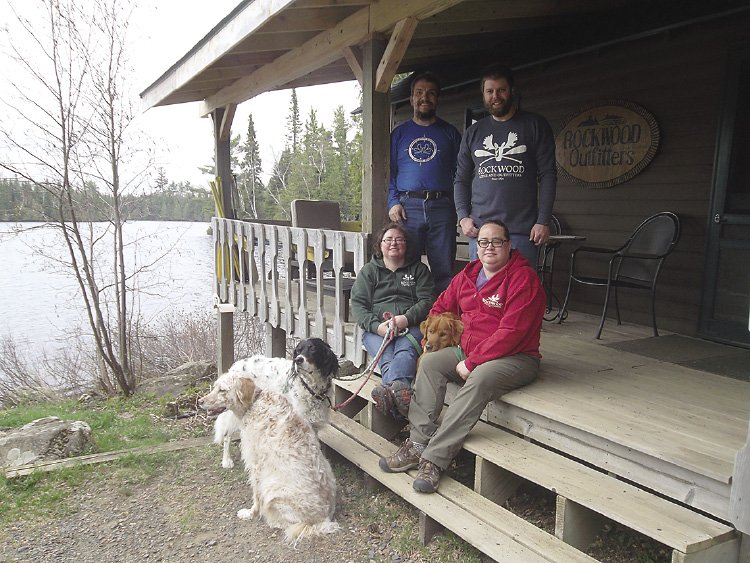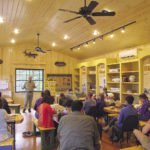Faced with a summer that is being defined by a global pandemic, canoe outfitters along the Gunflint Trail are doing all that they can to prepare for the coming season.
Nobody knows exactly what sort of impact the pandemic will have on the number of visitors to the Boundary Waters Canoe Area Wilderness (BWCAW) this summer. As lakes continue to warm and the forest springs to life, will folks turn to the Northwoods for the “ultimate” experience in social distancing? Or will more people be inclined to stay home to better shelter in place?
Regardless of the uncertainty, however, outfitters are taking the necessary steps to ensure that those that do choose to social distance in the country’s most popular wilderness area will be able to do so safely and with confidence. While outfitters are finding solutions to the challenges posed by COVID-19 in different ways, across the board they are all taking the current crisis very, very seriously.
The owners of Rockwood Lodge and Outfitting, for instance, have incorporated a whole new set of protocols into their operations in order to adapt to a world with COVID-19.
“Right away, people arriving to Rockwood see our masks and know that we take this seriously,” says Carl Madsen, part-owner of Rockwood Lodge and Outfitting. “We require everyone to wear masks—my mask protects you and your mask protects me.”
Madsen and his wife, Stephanie, have owned and operated Rockwood Lodge and Outfitting with Carol and Mike Seim, Stephanie’s sister and brother-in-law, since purchasing the business back in the fall of 2015.
As an outfitter, Rockwood rents out a fleet of 60 canoes, eight sea kayaks, four stand up paddleboards, three motor boats, and all of the necessary gear for an overnight stay in the BWCAW. Rockwood also operates eight cabins, four private bunkhouses, and a historic main lodge that, according to Madsen, “looks like it should be on the front of a Maple Syrup bottle.”
“The lodge is truly classic,” says Madsen. “It was a high-end steakhouse for nearly 50 years, but there hasn’t been a restaurant there since 1999.”
In normal times, the main lodge functions as a shop and hang-out area for guests, a great place to kick back and relax in a historic atmosphere. Unfortunately, because of risk brought on by the pandemic the main lodge will be closed to visitors this summer, at
least initially.
“Customers will still be able to view items that are for sale online and make purchases that way,” says Madsen. “It’s not a perfect system, but it will have to be one of those things that we figure out as we go.”
Madsen is quick to point out that the challenge imposed on outfitters by the pandemic is “twofold,” as businesses need to figure out how to offer a safe experience to guests while also taking necessary measures to protect themselves and their staff from exposure to the virus.
“We bought a lot of new bedding for the cabins,” says Madsen, “so we’ll be able to change all of it out between stays; a complete turnover.”
“On top of that,” continues Madsen, “we ‘blanked-out’ gaps of availability between cabin and bunkhouse stays to allow the units to sit before cleaning. [Blanking-out availability] will give our cleaning staff time to turn over the cabin safely, and react to new challenges as they come about.”
As far as changes to outfitting are concerned, Madsen and his partners will be issuing permits outdoors, will only allow one group at a time on their beach, and plan to pre-position canoes and gear ahead of time. They will also be setting up Lysol spray and handwashing stations throughout the property, and will utilize their new steam power washer, a machine that can blast water at 250 degrees Fahrenheit, to “really clean canoes well.”
“We always wash our gear well anyways,” says Madsen, “so not a lot is going to change there. That being said, we are going to allow additional time between each use, and we will be sanitizing the gear after cleaning to be safe.”
Utilizing time between lodging stays and gear use has quickly become the new norm among outfitters. Hungry Jack Outfitters, for example, has gone as far as shortening already booked reservations to ensure adequate time between stays.
As the largest outfitter on the trail, Gunflint Lodge and Outfitters has also implemented a number of key changes to their operations in the face of the pandemic.
In addition to many of the changes already described, Gunflint Lodge has made it possible for their guests to “work remote, really remote” by adding Wi-Fi access to its cabins, so guests working remotely will be able to without congregating in the main lodge.
The additional Wi-Fi access, coupled with new procedures that make it possible for “contact free check-in and check-out,” make it possible to social distance effectively while enjoying all that the Northwoods has to offer.
A detailed list of everything that Gunflint Lodge is doing to adapt to the current crisis can be found on their website at: gunflint.com/covid-19-policies.
In the end, the surest way to understand what is being done to make camping in the BWCAW safe is to reach out to outfitters directly. Outfitters on the Gunflint Trail are happy to walk anyone through the various measures they are taking to provide their customers with a safe, memorable summer experience, one that can only be found in the BWCAW.




